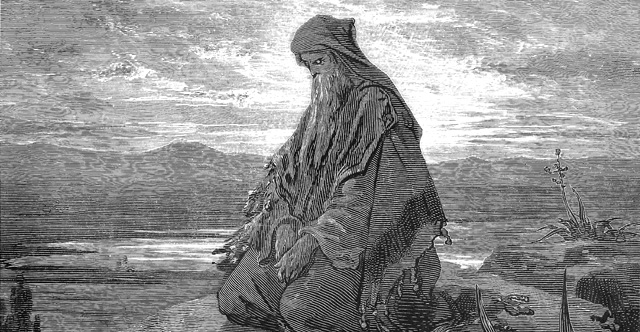
1
“
Where has your loved one gone, O most beautiful among women? Where has your loved one turned, that we may look for him with you?” The Woman
Dov'è andato il tuo diletto, o la piú bella fra le donne? Dove si è recato il tuo diletto, perché lo possiamo cercare con te?
2
“
My love has gone down to his garden, to the beds of spices. He has gone to feed his flock in the gardens and to gather lilies.
Il mio diletto è sceso nel suo giardino, nelle aiuole di balsamo a pascolare il gregge nei giardini e a cogliere gigli.
3
I
am my love’s, and my love is mine, he who feeds his flock among the lilies.” The Fifth Song King Solomon
Io sono del mio diletto, e il mio diletto è mio; egli pascola il gregge fra i gigli.
4
“
You are as beautiful as Tirzah, my love, as beautiful as Jerusalem. You are to be feared as an army with flags.
Amica mia, tu sei bella come Tirtsah, leggiadra come Gerusalemme, tremenda come un esercito a bandiere spiegate.
5
T
urn your eyes away from me, for they trouble me. Your hair is like a flock of goats that has come down from Gilead.
Distogli da me i tuoi occhi, perché mi turbano. I tuoi capelli sono come un gregge di capre, che pascolano sul monte Galaad.
6
Y
our teeth are like a flock of sheep which has come up from the washing. All of them give birth to two lambs at a time, and not one of them has lost her young.
I tuoi denti sono come un gregge di pecore, che tornano dal lavatoio, tutte hanno gemelli e nessuna di esse è sterile,
7
T
he sides of your forehead are like a piece of a pomegranate behind your face-covering.
Le tue tempie dietro al tuo velo sono come uno spicchio di melagrana.
8
T
here are sixty queens, and eighty women kept who act like wives, and there are too many young women to number who have never had a man.
Ci sono sessanta regine e ottanta concubine, e fanciulle senza numero.
9
B
ut my dove, my perfect one, is special. She is her mother’s only daughter. She is the pure child of the one who gave birth to her. The young women saw her and knew she was honored. The queens and the women who act as wives praised her, saying,
Ma la mia colomba, la mia perfetta, è unica; è l'unica di sua madre, la prescelta di colei che l'ha partorita. Le fanciulle l'hanno vista e l'hanno proclamata beata, sí, anche le regine e le concubine, e l'hanno lodata.
10
‘
Who is this that looks out like the first light of day? She is as beautiful as the full moon, as pure as the sun. She is to be feared as an army with flags.’” The Woman
Chi è costei che appare come l'alba, bella come la luna, pura come il sole, tremenda come un esercito a bandiere spiegate?
11
“
I went down to the field of nut trees to see the flowers of the valley, to see if the vines or the pomegranates had flowers.
Io sono discesa nel giardino dei noci per vedere le piante verdeggianti della valle, per vedere se le viti erano in fiore e i melograni mettevano le gemme.
12
B
efore I knew it, I wanted to be over the war-wagons of the princes of my people.” Women of Jerusalem
Non so come, ma il mio desiderio mi ha posta sui carri del mio nobile popolo.
13
“
Return, return, O Shulammite! Return, return, that we may look upon you!” The Woman “Why should you look upon the Shulammite, as upon a dance in front of two armies?”
Ritorna, ritorna, o Shulammita, ritorna, ritorna, perché possiamo ammirarti. Che cosa vedete nella Shulammita? Come una danza a due schiere?
 English
English
 Albanian - Shqip
Albanian - Shqip
 Arabic - العربية
Arabic - العربية
 Bulgarian - Български
Bulgarian - Български
 Chinese - 汉语
Chinese - 汉语
 English - English
English - English
 French - Français
French - Français
 German - Deutsch
German - Deutsch
 Italian - Italiano
Italian - Italiano
 Māori - Te Reo Māori
Māori - Te Reo Māori
 Portuguese - Português
Portuguese - Português
 Romanian - Română
Romanian - Română
 Russian - Русский
Russian - Русский
 Somali - Af Soomaali
Somali - Af Soomaali
 Spanish - Español
Spanish - Español
 Ukrainian - Українська
Ukrainian - Українська
 Vietnamese - Tiêng Viêt
Vietnamese - Tiêng Viêt
 Italian
Italian
 Albanian - Shqip
Albanian - Shqip
 Arabic - العربية
Arabic - العربية
 Bulgarian - Български
Bulgarian - Български
 Chinese - 汉语
Chinese - 汉语
 English - English
English - English
 French - Français
French - Français
 German - Deutsch
German - Deutsch
 Italian - Italiano
Italian - Italiano
 Māori - Te Reo Māori
Māori - Te Reo Māori
 Portuguese - Português
Portuguese - Português
 Romanian - Română
Romanian - Română
 Russian - Русский
Russian - Русский
 Somali - Af Soomaali
Somali - Af Soomaali
 Spanish - Español
Spanish - Español
 Ukrainian - Українська
Ukrainian - Українська
 Vietnamese - Tiêng Viêt
Vietnamese - Tiêng Viêt
